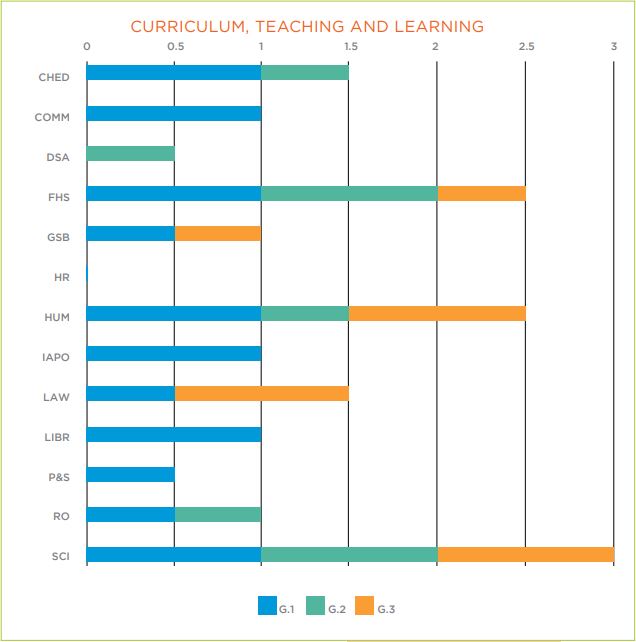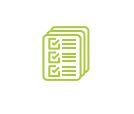Curriculum support: decolonisation, marginalisation and accessibility
04 November 2022
To what extent are the curriculum and pedagogy employed meeting the needs of and accessible to marginalised persons? How have the curriculum, pedagogy and the broader learning environment been decolonised?

What is being tested?
 |
Contribution to policy | G.1 (a) In the preceding 12 months, the faculty has initiated a review, implemented changes or assessed curriculum and pedagogy to address obstacles which impede student success. The review implemented changes or the assessment explicitly responded to colonialism, systemic racism or other examples of structural inequality and violence. (b) In the preceding 12 months, the non-academic department has initiated a review, changes or an assessment of aspects or processes within the learning environment (access to ICTS, communications on race, community safety, research methodology, etc) which impede full enjoyment of the teaching, learning or research environment. The review, implemented changes or assessment should explicitly respond to colonialism, systemic racism or other examples of structural inequality and violence. |
 |
Transformative interventions | G.2 In the past 12 months staff received training and/or capacity building on sensitively talking about oppression within classrooms and integrating content on anti-oppression into curriculum and teaching resources. Training and capacity building covered, but was not limited to, themes such as intersecting inequalities, decolonialism, HIV/AIDS, GBV, sexual and gender diversity, or transformation, inclusivity and diversity. |
 |
Knowledge and advocacy | D.3 In the past two years, research (including informal and activist research) has been conducted and/or published on either integrating anti-oppressive content into teaching and learning, or integrating anti-oppressive approaches to ensure the full enjoyment of the learning environment. |
What does the benchmark reveal?
One of the central demands of the #FeesMustFall and #RhodesMustFall movements was for inclusive, accessible and decolonised education. This benchmark describes the actions departments and faculties could take to make the pedagogy, curriculum and the broader learning environment (including operations and administration) more accessible and relevant to marginalised communities. While more actions were undertaken in this area in 2021 than in 2019 and 2020, few departments and faculties were able to meet this benchmark. Part of the reason for this is likely due to some of the challenges caused by COVID-19 and emergency remote learning. Another explanation could be that colonial and hierarchical pedagogies are entrenched within the university and difficult to dislodge.
 |
Although not all benchmark criteria were met, many faculties and some departments reviewed aspects of the teaching, learning and research environment to be more inclusive of diverse constituencies or to respond to forms of structural inequality and violence. Non-academic departments were less active in reviewing their practices that may affect students. |
 |
Only a few faculties and departments initiated trainings on anti-oppressive methods with staff members, and fewer conducted or published research on integrating anti-oppressive approaches. While more actions were reported in 2021, it’s important to acknowledge that on average, only 40% of the Curriculum Support benchmark criteria were met. |
Which actions contributed to this benchmark?
The momentum behind decolonising the curriculum and pedagogy at UCT was negatively impacted by COVID-19 and the shift to emergency remote teaching and learning. In 2020, the focus was primarily on parity of online participation. With the lull in COVID-19 and the shift back to normal, more faculties and departments were able to return their focus to integrating content related to race, gender, sexuality and disability, or to integrate diversity, inclusion, decolonial or Afrocentric lenses. Beyond these efforts, a range of other examples were shared:
- Where systemic reviews of curriculum were not present, many reported actions to create accessible blended, online and physically distanced learning approaches.
- The New Academic Practitioner’s Programme reported centring decolonial and feminist approaches to the classroom in its training programme. In addition, other entities reported developing Afrocentric examples and cases, challenging racism and patriarchy in the classroom, or being open to linguistic diversity and translingualism.
- Some entities reported hosting workshops on GBV, sexual and gender diversity, race and racism, decolonialism, and diversity and inclusion with staff members. The purpose of these workshops was to strengthen staff capacity to create inclusive learning spaces.
- The Campus Protection Services safety awareness campaign contributed to this benchmark through ensuring safe access to and movement across UCT campuses. The campaign also focused on safety using a gender lens to ensure the safety of womxn and gender non-conforming persons.
- At the Research Office, the Researcher Development Academy began to offer training to African researchers and undertook actions to increase the visibility of African research.
- In addition, several articles were published on this benchmark area, including these examples:
- Book: Decolonising Curricula and Pedagogy in Higher Education
- Chapter: “Translanguaging Pedagogies in the Humanities and Social Sciences in South Africa: Affordances and Constraints”
- Journal article: “How HERI (Human Evolution Research Institute) is disrupting, transforming and decolonising long-held patriarchal narratives of human evolution in South Africa”
Who contributed to this benchmark?
Seven faculties and five non-academic departments contributed to this benchmark.
How effective were the actions?
This benchmark aims to capture the extent to which the curriculum and pedagogy employed are meeting the needs of, and are accessible to marginalised persons. In reporting on this benchmark, many faculties shared concrete examples of changes which attempt to decolonise pedagogy, curriculum and the broader learning environment. While these efforts are useful, It is unclear how these disrupt or trouble hierarchical power dynamics implicit in the student–lecturer relationship, the supremacy of the English language, or the dominance of Euro-American epistemic practices.
Recommendations
More actions that employ activist pedagogies, that counter curricula, and challenge capitalist approaches to education may be needed. These would allow for transforming curricula to move beyond integrating social justice content to shifting power dynamics between students and lecturers, and between the university and the participants (as opposed to their current construction as “consumers”) in the processes of producing knowledge.
An example of a good practice
Since 2020, the Humanities faculty has offered first-year level courses, named the Khanyisa Courses.
These specifically focus on decolonising education curricula through using content drawn from the African continent and unconventional teaching and learning methods. The purpose of the Khanyisa Suite of courses is to develop critical reading and writing skills in the Humanities.
In 2021, the Humanities Education Development Unit added new courses onto the Khanyisa Suite, which centres content that engages students’ life worlds and introduces them to the study of arts and social sciences in ways that are cognisant of UCT’s African location. Khanyisa Suite foregrounds the historical development of the discipline and is self-reflexive about the privileging of canonical texts and hegemonic perspectives. It facilitates the revision of those courses towards innovative teaching and delivery methods that may cut down on lecture periods, allowing more time for active engagement and skills development, as well as the option of allowing for multilingualism and translanguaging in the classroom. This also includes the re-conceptualisation of assessment methods that are aligned with a reflexive pedagogical approach, with a higher weighting on coursework (project work, tests, debates, essays, etc) and a lower weighting on formal exams.
Institutional transformation projects: Building Brave Classrooms
In 2021, the OIC initiated a range of interventions that assisted faculties and departments to integrate content on and respond to inequalities in the classroom. The Building Brave Classrooms approach is based on the work of Sara Ahmed (2018) and aims to create brave rather than coddled conversation about key social issues. For example:
- The OIC led the “HIV and ME” component of the “Becoming a Health Professional” course offered to all first-year students in the FHS. The “HIV and ME” process included a panel discussion with community experts focusing on stigma and discrimination, a youth-led small group workshop on sex and sexual health, and a digital consolidation lecture on HIV led by activist and medical doctor, Anastacia Tomson.
- The OIC also supported the Chemical Engineering department to integrate content on negotiating differences and diversity within teams. Through interactive lectures on negotiating differences and diversity, training tutors working with the class, and developing content for the group’s team-building exercise, the OIC was able to support students to think more openly and critically about differences related to race, gender, class and sexuality, among other factors.
The transformation of the academic project is central to transforming the university as a whole. In 2021, entities had a renewed focus on reviewing curricula and integrating social justice content and lenses within their work. Many micro-interventions are present in faculties across the university. The interventions use race, gender, class and sexuality (among other factors) as inroads into thinking about healthcare, legal systems, social phenomena and our shared past. These micro-interventions are only present in some spaces within the university. For the university to achieve this benchmark, existing good practices need to be upscaled and shared within their relevant faculties to inspire other courses to also implement changes. In addition, transformation agents leading these courses should be convened to share good practices and to create opportunities for collaboration.

Warning signs
In the first three years of capturing data on the benchmarks, entities reported meeting 35–45% of the Curriculum Support benchmark requirements. While more entities reported meeting this benchmark’s criteria in 2021, it’s important to appreciate that few entities are still able to meet this benchmark

Sparks
While the above challenges are present, there are several hopeful sparks of change. For example, entities focus on a wide range of social themes and employ diverse lenses to further TDI in the teaching and learning space. With a little support, connections can be made between these disparate approaches and an intersectional lens could emerge.

Transformative awakening
In 2021, the OIC hosted a pilot workshop series, “Decolonising Teaching and Learning” with the School of Public Health and Family Medicine. The pilot used the Curriculum Change Framework document and activist scholarship to work with a small group of course convenors to review their curricula and pedagogy. This small pilot offers a practice that could be useful with other entities at UCT.
 This work is licensed under a Creative Commons Attribution-NoDerivatives 4.0 International License.
This work is licensed under a Creative Commons Attribution-NoDerivatives 4.0 International License.
Please view the republishing articles page for more information.






